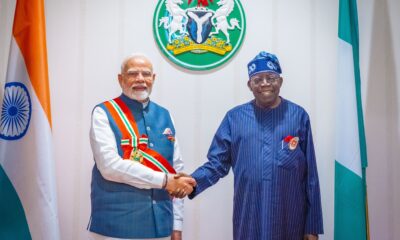Opinion/Feature
Nigeria At 64: Celebrating Our Rich History, Diversity, Heritage And Bright Future

By Bashir Ahmad, OON
As Nigeria marks its 64th independence anniversary, let’s reflect on the journey that began on October 1, 1960, when our nation declared its sovereignty from British colonial rule.
Sixty-four years later, we celebrate not only the remarkable milestones achieved but also the enduring spirit of our unity, resilience, and hope that defines Nigeria.
Nigeria’s history is as diverse as its people. Long before the colonial era, the place that is now Nigeria was home to ancient civilizations such as Hausa, Kanuri, Ife, and Benin, whose legacies in art, governance, and trade continue to inspire pride. The unification of the northern and southern protectorates in 1914 set the stage for a modern Nigeria, culminating in its independence in 1960.
Since then, Nigeria has faced challenges, from civil conflict to political upheaval, yet the country has continually evolved. We have made significant strides in governance, education, and international diplomacy, establishing ourselves as a key player on the African continent and the world.
Nigeria’s strength lies in our diversity. With over 250 ethnic groups, the country is a melting pot of languages, cultures, and traditions. From Hausa, Yoruba to Igbo in the southeast, each group brings its own unique contribution to Nigeria’s rich cultural mosaic.
Our diversity is not only seen in culture but also in religion, with Islam and Christianity beliefs coexisting within the same space. This diversity is a source of strength and creativity, seen in our world-renowned literature, music, Nollywood/Kannywood films, and innovative industries.
Our cultural heritage is one of the most celebrated in Africa and beyond. The ancient art of Ife and Benin, the festivals of Osun-Osogbo, the Durbar celebrations in Kano and northern states, and the vibrant Afrobeats sound that has taken the world by storm are just a few examples of the immense cultural wealth our nation holds.
Nigeria’s natural heritage is equally impressive. From the Aso/Zuma Rock, the Yankari Games Reserve to the Obudu Cattle Ranch, the landscapes are as diverse as the people, offering vast potential for tourism and sustainable development.
As we celebrate our 64th Independence Day, it is essential to acknowledge that challenges remain. The country continues to grapple with issues such as economic inequality, insecurity, and political tension. However, Nigeria’s future remains bright, with immense potential for growth and development. The recent advances in technology, entrepreneurship, and a booming youth population present opportunities for progress and innovation.
As we look ahead, the vision of becoming one of the world’s leading economies is within reach. With the right leadership, investment in infrastructure, education, and technology, and a commitment to good governance, we can harness our vast human and natural resources to achieve sustainable development and economic growth.
On this 64th anniversary, let’s celebrate the journey so far and renew our commitment to the ideals of unity, peace, and progress. Together, as one people, we will continue to build a Nigeria that not only honors its past but also embraces its future with confidence and optimism.
Happy Independence Day, Nigeria!
Bashir Ahmad, OON, from Kano, Nigeria
Opinion/Feature
Downstream Deregulation: Between Obasanjo’s Half-measures And Tinubu’s Bold Leadership

Opinion/Feature
UNCOMMON SCHOLAR, EXCEPTIONAL ADMINISTRATOR: MY TRIBUTE TO PROF. OLOYEDE AT 70

By President Bola Tinubu
As Professor Ishaq Oloyede turns 70 tomorrow, October 10, I pay a special tribute to this astute administrator, educator, author, and scholar, currently the Joint Admissions and Matriculation Board (JAMB) Registrar.
As the former Vice Chancellor of the University of Ilorin, Prof. Oloyede’s invaluable contributions to the nation through academia and public-sector administration have significantly impacted the academic community.
ALSO READ: Tinubu Congratulates Zainab Shinkafi-Bagudu On Her Election As President, UICC
His impactful tenure at the University of Ilorin, during which he introduced landmark ideas and innovations that helped the institution attain enviable heights, is on record.
Through patriotic dedication and commitment to his craft, Prof Oloyede imparted knowledge and character to thousands of students who underwent his teaching during his glorious and impactful academic career.
Indeed, the bedrock of development lies in education. Developing nations, including Nigeria, are in dire need of more scholars like Prof. Oloyede. His selfless sacrifices and innovative approaches to learning and leadership give hope for a brighter future.
Perhaps more remarkable is Prof. Oloyede’s transformative leadership at JAMB. He pioneered and sustained a series of reforms and technological innovations that have made the admission process in Nigeria transparent and credible.
In his eight years of stewardship at the board, thus far, Prof. Oloyede has demonstrated an uncommon commitment to financial integrity and accountability in public service. He has also raised the bar in administration and management.
I am proud of Prof. Oloyede’s accomplishments.
The nation owes the Professor of Islamic Jurisprudence a debt of gratitude for transforming JAMB, traditionally a non-revenue-generating government agency, into a consistent contributor to the national treasury through efficient financial management. His contributions to JAMB are invaluable and greatly appreciated.
On this occasion of his 70th birthday, I join members of the academic community, students, JAMB staff, and well-wishers in celebrating this scholar who, in words and deeds, has also done a lot to propagate the Islamic religion.
I pray that Almighty Allah will continue to honour the distinguished professor with health, wisdom and strength to serve the nation for many more years.
Opinion/Feature
Clarification On NNPCL Refinery Operations

By Sen. Heineken Lokpobiri PhD
My attention has been drawn to statements made by Engr. Kamoru Busari, Director of Upstream in the Ministry of Petroleum Resources, who represented me at a recent conference in Lagos. I wish to categorically state that the claim that I directed the Nigerian National Petroleum Company Limited (NNPCL) to stop running its own refineries and focus solely on equity participation in other refineries is false. This does not represent my position as Minister overseeing the oil sector, nor does it reflect the stance of the Federal Government.
It is important to clarify that NNPCL is a company governed under the Companies and Allied Matters Act (CAMA), with a functional board and management. The Ministry of Petroleum Resources does not control or run NNPCL, as it operates independently like any corporate entity.
ALSO READ: NNPC/Seplat JV’s “Eye Can See” Programme Restores Vision, Hope In Imo
The oil and gas sector is fully deregulated, and the Nigerian government remains committed to promoting in-country refining. We encourage companies, including NNPCL, to operate independently, following global best practices. While we provide strategic guidance, we do not interfere directly in the operations of these companies.
I reaffirm our commitment to supporting the growth and independence of NNPCL, ensuring that its operations are in line with international standards for efficiency and transparency and profitability.
Sen. Heineken Lokpobiri PhD, Minister of State Petroleum Resources (Oil), wrote from Abuja, Nigeria















